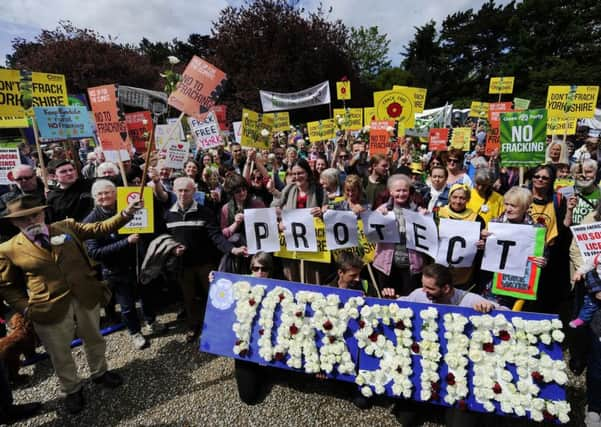Chris Redston: Fracking cash pledge evaporates in a puff of gas


However, homeowners in this quiet Ryedale village should avoid ordering a new kitchen any time soon, as they may have to wait up to 10 years for any such windfall – if they ever receive a payment at all.
The Government recently announced a public consultation which recommends that payments from the so-called Shale Wealth Fund could be paid directly to individual households, rather than to councils and local trusts, as was previously planned.
Advertisement
Hide AdAdvertisement
Hide AdMany national newspapers greeted the news with headlines promising their readers ‘up to £13,000’ in the ‘great shale bonanza’ if they happened to live near a fracking well-site. However, look behind the hyperbole and the claims of five-figure ‘frackpot’ windfalls start to unravel.
Firstly, there are no plans for any up-front cash payments from the Government to people living near fracking sites. Instead, the Shale Wealth Fund would be financed by diverting 10 per cent of tax revenue on energy companies’ profits from fracking. This means that no payments could be made to anyone until fracking itself becomes profitable. This is by no means a certainty, as the dozens of American fracking companies that went bust in 2015 will attest.
There is a general acceptance within the UK industry that even if the growing opposition to fracking were to magically evaporate (which it won’t), full commercial production could not take place until around 2020.
Cuadrilla has already spent £100m on exploration costs, and expects to spend at least £50m more before starting commercial production. Profits from fracking would first be used to offset these costs – not to compensate impacted communities.
Advertisement
Hide AdAdvertisement
Hide AdAlso, as we know from the Panama Papers, companies do everything they can to avoid paying tax. Firms could sell gas at cost price to another subsidiary, thus avoiding paying tax on their shale gas production.
Kirby Misperton residents planning a winter holiday funded by Third Energy’s profits shouldn’t hold their breath.
Whether such payments are seen as compensation or simply a bribe, as many opponents argue, the Government’s announcement is nevertheless a tacit admission that people do need to be compensated for living near a fracking well-site. What people should now be asking is what exactly would the Government be compensating us for?
Would it, for example, compensate people for any fall in property prices? A report in Mortgage Introducer magazine says that house prices near Preese Hall in Lancashire – the only well ever fracked in the UK – have dropped by four per cent.
Advertisement
Hide AdAdvertisement
Hide AdThe Government’s draft DEFRA Shale Gas Rural Economy Impacts Paper said: “There could be a seven per cent reduction in property values within one mile of an extraction site.”
And Ray Boulger, from leading mortgage adviser John Charcol, said last year: “The prospect of fracking in your area is a bit like putting a motorway or railway, like HS2, through your front garden – it’s going to have an impact on the valuation of your property.”
Perhaps this money is compensation for the tens of thousands of truck movements through their village, or for years of sleepless nights from 24/7 drilling and fracking at a multi-well site? Or maybe it would compensate families for the health risks of fracking, which are now well documented.
These include a recent study by John Hopkins University, which found that people living near fracking wells in Pennsylvania were up to four times more likely to suffer asthma attacks.
Advertisement
Hide AdAdvertisement
Hide AdAn earlier study found that expectant mothers living in the most active fracking areas were 40 per cent more likely to give birth prematurely, and 30 per cent more likely to have a high-risk pregnancy.
In retrospect, it appears that the Government’s announcement was simply the latest attempt to bolster flagging support for this unwanted and unpopular industry. If that was the intention, it has failed to win over the majority of the public.
A YouGov survey, published earlier this month, found that only 33 per cent of people would support fracking in their local area if individual households received a payment of up to £10,000.
In contrast, 43 per cent said they would still oppose fracking, despite the payment. The Government’s Wave Tracker survey shows that only 21 per cent support fracking, compared to 76 per cent who support renewables.
Advertisement
Hide AdAdvertisement
Hide AdIn the statement accompanying the Shale Wealth Fund consultation, Theresa May said: “The Government I lead will be always be driven by the interests of the many.”
It’s high time the Prime Minister really started listening to the views of the many – who are demanding massive investment in safe, clean renewable energy – and put the UK’s struggling fracking industry out of its misery.
Chris Redston is a campaigner for Frack Free Ryedale.